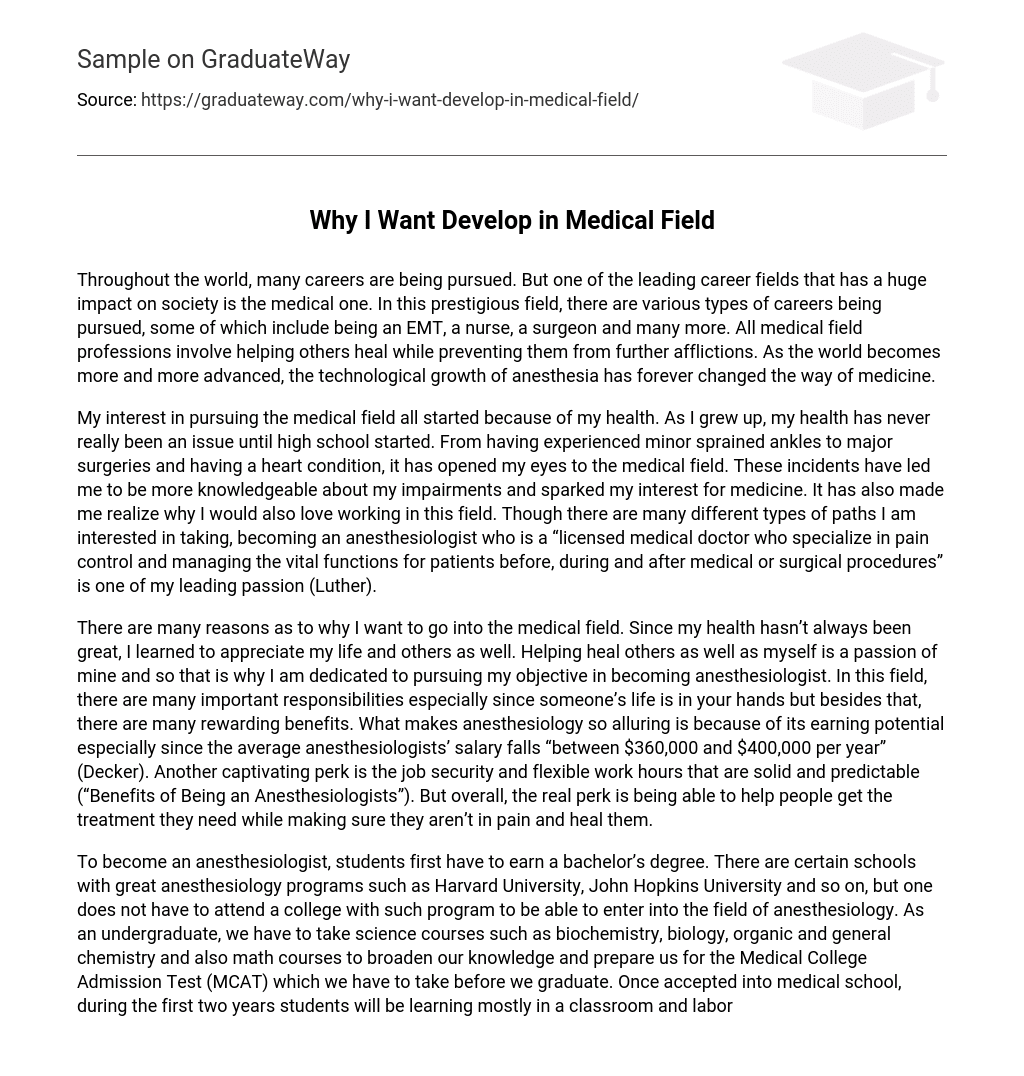Throughout the world, many careers are being pursued. But one of the leading career fields that has a huge impact on society is the medical one. In this prestigious field, there are various types of careers being pursued, some of which include being an EMT, a nurse, a surgeon and many more. All medical field professions involve helping others heal while preventing them from further afflictions. As the world becomes more and more advanced, the technological growth of anesthesia has forever changed the way of medicine.
My interest in pursuing the medical field all started because of my health. As I grew up, my health has never really been an issue until high school started. From having experienced minor sprained ankles to major surgeries and having a heart condition, it has opened my eyes to the medical field. These incidents have led me to be more knowledgeable about my impairments and sparked my interest for medicine. It has also made me realize why I would also love working in this field. Though there are many different types of paths I am interested in taking, becoming an anesthesiologist who is a “licensed medical doctor who specialize in pain control and managing the vital functions for patients before, during and after medical or surgical procedures” is one of my leading passion (Luther).
There are many reasons as to why I want to go into the medical field. Since my health hasn’t always been great, I learned to appreciate my life and others as well. Helping heal others as well as myself is a passion of mine and so that is why I am dedicated to pursuing my objective in becoming anesthesiologist. In this field, there are many important responsibilities especially since someone’s life is in your hands but besides that, there are many rewarding benefits. What makes anesthesiology so alluring is because of its earning potential especially since the average anesthesiologists’ salary falls “between $360,000 and $400,000 per year” (Decker). Another captivating perk is the job security and flexible work hours that are solid and predictable (“Benefits of Being an Anesthesiologists”). But overall, the real perk is being able to help people get the treatment they need while making sure they aren’t in pain and heal them.
To become an anesthesiologist, students first have to earn a bachelor’s degree. There are certain schools with great anesthesiology programs such as Harvard University, John Hopkins University and so on, but one does not have to attend a college with such program to be able to enter into the field of anesthesiology. As an undergraduate, we have to take science courses such as biochemistry, biology, organic and general chemistry and also math courses to broaden our knowledge and prepare us for the Medical College Admission Test (MCAT) which we have to take before we graduate. Once accepted into medical school, during the first two years students will be learning mostly in a classroom and laboratory while in the last two years, they will be under the supervision of medical professionals learning clinical practice (“How to Become an Anesthesiologist”). After graduating from medical school and receiving a Doctorate of Medicine degree (MD), prospective anesthesiologists have to complete four years of anesthesiology residency in which they will train with skilled medical faculty in their profession. Although “some doctors follow their residency with a fellowship to further train in anesthesiology specialties,” it is not required to obtain a state license to practice medicine (“How to Become an Anesthesiologist”). There are three different levels of credentialing which exist for anesthesiologists, one being a “licensure [which] is a state-based credential that includes passage of the U.S. Medical and Licensing Examination (USMLE)…[that] can be obtained upon graduation (“Anesthesiologist: Education Requirements and Career Information”). The last type of credential an anesthesiologist can earn is the American Board of Anesthesiology (ABA) certification that require a three part exam. To earn an ABA certification, one has to first take the BASIC exam which “focuses on the scientific basis of anesthesiology practice” after their second year of residency. The next assessment, the ADVANCED exam, “focuses on clinical and advanced aspects of anesthesiology” and taken after residency is completed while the last one, the APPLIED exam, involves an oral and clinical examination in which anesthesiologists have seven years to pass this exam after completing their residence. The overall time it takes to become an anesthesiologist is at least twelve years because it takes four years each for undergraduate study and medical school and another four for residency but compared to other high paying jobs in the medical field, the training in anesthesiology is a lot shorter than those compared.
Choosing a career down the medical path is never the easy because of the long and intense learning, but there are many clear benefits as to why people still embrace the torment of going through medical school and residence for over twelve years. Many experience a rewarding satisfaction from helping others while there are others who also do it for the earning potential as well as other beneficial factors. As an anesthesiologist, many individuals gain a life experience out of this field for being more involved and making a difference aiding patients and other people to a better and healthier life while being mentally and financially content.





